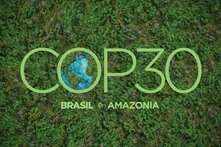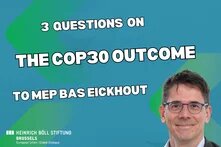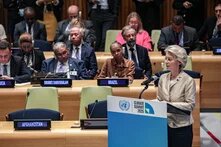Lisa Tostado unpacks some basics in the first report during her attendance at this year’s COP26 in Glasgow.

Read our web dossier on the COP26.
The United Nations Framework Convention on Climate Change (UNFCCC) has existed all my life (I am born in 1992) and compels its 197 members to fight global heating. As it does not offer much in terms of detail, the signatories meet regularly to work on more concrete steps towards the UNFCCC’s aims. This meeting is known as the COP, or conference of the parties. I read a sarcastic comment the other day that the abbreviation might as well stand for carefully orchestrated procrastination. How much truth lies in the statement? I am unpacking some basics in the first report during my attendance at this year’s COP.
After a one year delay, the meeting in the Scottish city of Glasgow is the 26th climate summit. The UK Government, the host, coined the motto “Keeping 1.5 alive”, a reference to the Paris Agreement, concluded at COP21. The text of the deal itself calls to limit the average temperature increase to well below 2°C above pre-industrial levels and to pursue efforts to limit the temperature increase to 1.5°C above pre-industrial levels. While that may not sound like a big difference, every tenth of a degree of warming has significant consequences. Impacts will not occur in a linear correlation to the heating, but are exponential, especially given numerous tipping points that can in turn have an accelerating effect on the climate crisis. Will COP26 put us on a path of 1.5 °C or at least 2 °?
Looking at the numbers, one has reason to be pessimistic. Humanity released half of emissions in the timespan of my and the UNFCCC’s existence. Governments' most recent plans remain insufficient and global emissions are projected to increase even further. Even if pledges are fulfilled, which is far from being certain, the world is heading towards 2.7°C of warming. The UNEP’s 2021 Production Gap report revealed that national fossil fuel production plans put the world on course to produce more than twice the level of fossil fuels compatible with a 1.5C world by 2030. A recent IPPC report finds that in the near term (2021-2040), the 1.5°C global warming level is more likely than not to be reached even under the most optimistic very low GHG emissions scenario. It remains technically possible if governments take rapid and far-reaching action to reduce emissions, but looking at the missed opportunity of a largely brown recovery as well as the insufficient national pledges, this seems unfortunately not realistic.
The COP is not only about mitigation pledges. Financing has also been at the heart of the debate. To put it simply, there are three important questions here: “Who is paying for the transition towards decarbonisation? Who is paying for the necessary adaptation to already unavoidable climate change impacts? And who is paying for loss and damage?” These questions all have an inherent justice dimension as those who contributed least to the crisis, will and already do suffer from it the most. In 2009, wealthy nations pledged to raise $100 billion a year by 2020 to help developing countries mitigate and – more and more crucially – adapt climate change. Once again, they’re falling short, undermining mutual trust and a sense of cooperation. The lack of inclusion particularly for this COP adds on to this problem.
The math and physics as well as the COP history and politics indicate that the sarcastic statement may not be that far-fetched. Yet, there are also reasons to be more hopeful.
Albeit too slow, things are moving – and presumably faster than without the UNFCCC and yearly COPs. Some developments for around this year’s COP are positive. Take methane for example. The very potent greenhouse gas has finally come into the spotlight. It traps more than 80 times the heat that the same amount of carbon dioxide does over a twenty year time period, but it degrades rapidly, so that action taken now can have an almost-immediate effect. The European Union and the United States, the two biggest fossil gas consumers, are leading a campaign to get countries to cut methane emissions by 30 percent this decade. I recognize that, once again, it is not enough: in order to limit global warming to 1.5°C, global methane emissions must be reduced by 40-45% by 2030 from a 2010 baseline and currently available measures could reduce methane emissions by as much as 45% by 2030. Still, 80 countries support this Global Methane Pledge that will be officially launched in Glasgow. Unlike COP21 in Paris in 2015, no new major accord is on the agenda this time around. Instead, COP26 is about putting the Paris Accord into practice. Technical compacts such as Global Methane Pledge may therefore not be fabulous, but they are useful on the way to climate neutrality.
In addition, most countries did submit enhanced plans — the key breakthrough of the Paris deal which asked each country to make a climate promise and then to increase ambition over time. Roughly three-quarters of the global economy — including the biggest polluter by far China — is now covered by a target to reach net-zero around the middle of the century or just after. Even though emissions will still be far too high, this is progress. And it could bring humanity closer to avoiding a total climate breakdown.
Another major reason for hope: the international climate youth movement has grown further and has “survived” the pandemic. Glasgow will be a major opportunity to get at least partially together physically again, meet, strategize, and put pressure on negotiators. A letter to raise awareness on the climate emergency has gathered over a million signatures in a very short period of time. New generations are making themselves heard in large numbers – be it in Glasgow or virtually. They are in large parts very well-informed about climate science, and use that knowledge to argue for honesty, hold leaders accountable and demand meaningful action. Many leaders seem to feel caught on the abundance of “blah blah blah” which climate activist Greta Thunberg denounced a few weeks ago, and refer back to it in interviews and speeches.
Is the COP just carefully orchestrated procrastination? I hope not, but my expectations are modest. I hope it can create at least momentum, have media attention for the issue, expose shortcomings, foster debate on real solutions, and offer space for people in the climate community to meet. The world simply cannot afford procrastination.


